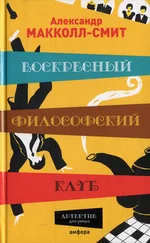‘I shall wait, Mma,’ said Mma Ramotswe. ‘It is not too hot and I am not thirsty.’
They took a seat in the small waiting room. There were pictures of children on the walls, including a photograph of one of the orphans who had done particularly well in the recent school-leaving examinations. The assistant, noticing that Mma Ramotswe was looking at the photograph with interest, said, ‘That is a very clever girl, Mma. She came to us when she was three and has been with us since then. She won one of the scholarships to Maru-a-Pula School and now Mr Taylor is getting her something that will take her to university. She wants to be a vet. Think of that, Mma – one of our children becoming a vet. She will be able to take care of the few cattle we have here – and the goats, too, I think.’
‘It is a very good thought,’ said Mma Ramotswe. She turned to Mma Makutsi. ‘That’s good, isn’t it?’
‘Maybe,’ said Mma Makutsi, barely audibly.
The door to Mma Potokwani’s office opened and a woman dressed in a flowery dress stepped out. She smiled benignly at Mma Ramotswe and Mma Makutsi before making her way out of the room. Behind her, framed in the office doorway, stood the familiar, generous-sized figure of Mma Potokwani.
‘You must come in, Bomma ,’ she said. ‘I have finished interviewing.’
This warm greeting drew a smile from Mma Ramotswe, even if Mma Makutsi gazed down at the floor. Mma Ramotswe saw Mma Potowkani glance at Mma Makutsi in a concerned way. She had picked up that something was wrong; of course, she would – if you were responsible for the welfare of two hundred people, children and housemothers, cooks and cleaners, then you learned to read moods.
They sat down while Mma Potokwani’s assistant put on the kettle.
‘I was interviewing a new housemother,’ said Mma Potokwani brightly. ‘That lady who went out – I think she’ll get the job. She had ten children of her own, you know, and now… well, she says that since the youngest has grown up she doesn’t know what to do with her time.’
‘Ten children is too many,’ said Mma Makutsi.
Mma Potokwani caught Mma Ramotswe’s eye; a silent message was exchanged.
‘Children are good for Botswana,’ said Mma Potokwani evenly. ‘We still have a lot of room in this country.’
Mma Makutsi said nothing.
‘Mma Makutsi,’ said Mma Potokwani, ‘I can tell that something is wrong.’
‘I am fine,’ sniffed Mma Makutsi.
‘No, you aren’t, Mma. I can tell that you are not fine. You are very unhappy about something.’ She hesitated for a moment before continuing, ‘It’s this new café, isn’t it?’
Mma Makutsi looked straight ahead of her. She took off her glasses and began to polish them. Mma Potokwani signalled to her assistant to fetch the fruit cake tin.
‘It is very difficult running a business,’ began Mma Makutsi.
‘Of course it is,’ said Mma Potokwani. ‘Probably even harder than running an orphan farm.’
The implicit compliment winkled a response out of Mma Makutsi. ‘I have had trouble with my chef,’ she said.
Mma Potokwani nodded her head in agreement. ‘That man is very troublesome. He is not really a cook, you know. That business about having worked in the Grand Palm – complete nonsense.’
Mma Makutsi seemed surprised to hear that Mma Potokwani knew about Thomas Disang. ‘You know of him, Mma?’
Mma Potokwani looked sympathetic. ‘Many people know about him,’ she said. ‘He is what they call a chancer, I think.’
‘And the waiter?’
‘He is his son, I believe,’ said Mma Potokwani.
Mma Makutsi turned to Mma Ramotswe. ‘Everybody will be laughing at me,’ she said. ‘My name is going to make people laugh and laugh. They’ll say: “Mma Makutsi”, and then people will start laughing.’
‘They will not,’ said Mma Ramotswe. ‘They will not laugh.’
‘No,’ said Mma Potokwani. ‘Not if you…’ She trailed off.
‘Not if I what?’ asked Mma Makutsi.
‘Not if you change everything,’ said Mma Potokwani.
Mma Makutsi pointed out that after Violet Sephotho’s review it would make no difference. ‘The Disangs have handed in their notice and gone,’ she said, ‘but people will still remember that Sephotho woman’s warning. That is what this place is like, Mma. It is a village. You do not forget things in a village.’
Mma Potokwani was not discouraged. ‘You change the name,’ she said. ‘You change the clientele. You get a new chef. You change everything.’
‘I don’t see how you can change the clientele,’ objected Mma Makutsi.
The assistant had now prepared the tea. There was fruit cake, too – generous, therapeutic slices appeared on plates.
‘You don’t want handsome men,’ explained Mma Potokwani. ‘You don’t want that crowd.’
Mma Makutsi said nothing, but was listening intently.
‘You want women, Mma. Women like places where they can go and talk to other women.’
Mma Ramotswe began to smile. ‘Of course they do. Of course.’
‘So, instead of the Handsome Man’s De Luxe Café, you have the Ladies’ Afternoon Café.’
There was a long silence. In the distance, the children had stopped singing while Mma Potokwani had been speaking. Now there was only the sound of cicadas screeching outside. Somewhere, far away, a car’s engine whined.
Mma Makutsi was the first to speak. ‘The Ladies’ Afternoon Café,’ she intoned, giving each word its full weight. ‘The Ladies’ Afternoon Café.’
Mma Ramotswe clapped her hands together. ‘That will be very popular, Mma! Everybody will go… or, rather, all ladies will go.’
‘Not all,’ conceded Mma Potokwani. ‘But enough. And you needn’t have a full menu – they’re always lots of trouble. You will just have scones and cake.’
‘And tea,’ interjected Mma Ramotswe.
‘Of course.’
‘Redbush tea and ordinary tea.’
Mma Potokwani repeated the formula. ‘Redbush tea and ordinary.’
Mma Makutsi was thinking. ‘I’ll need people to do all this.’
Mma Potokwani lowered her eyes modestly. ‘I can manage it to begin with,’ she said. ‘Later on we can get a manager to take over from me. I have a retired housemother in mind who would love to do it. She is a famous baker of scones.’
Mma Makutsi looked enquiringly at Mma Ramotswe, who signalled that this was clearly a good idea. ‘Mma Potokwani is good at getting people to do things,’ she said. ‘You can count on her.’
‘So I needn’t worry about anything?’ asked Mma Makutsi, her tone now distinctly more cheerful.
‘Nothing at all,’ said Mma Potokwani. ‘In fact, you can forget about everything. You can go back to doing what you do so well, Mma, which is being one of the best detectives in the country.’
This flattery had an instant effect. ‘You’re very kind, Mma Potokwani,’ said Mma Makutsi.
Mma Potokwani made a self-effacing gesture. ‘I do not like to see my friends in difficulty.’ She paused. ‘Which is why I have a piece of news for you, Mma Ramotswe.’
Mma Ramotswe raised an eyebrow. ‘News, Mma? Good or bad?’
Mma Potokwani laughed. ‘Have a piece of fruit cake first, Mma. Fruit cake goes with…’
They waited.
‘Fruit cake goes with good news,’ concluded Mma Potokwani.
That evening, Mma Ramotswe and Mr J. L. B. Matekoni sat out on their veranda later than usual. It was a Friday evening, and Motholeli and Puso were both away on sleepovers with friends. As a result, the house was quieter than usual, prompting Mr J. L. B. Matekoni to turn on a radio, which Mma Ramotswe immediately switched off. ‘If you don’t mind, Rra,’ she said, ‘it will be more peaceful without music.’ He did not mind; Mma Ramotswe was right – they did not need any distraction: there was so much to talk about.
Читать дальше







![Александр Макколл Смит - Отдел деликатных расследований [litres]](/books/397661/aleksandr-makkoll-smit-otdel-delikatnyh-rassledova-thumb.webp)




